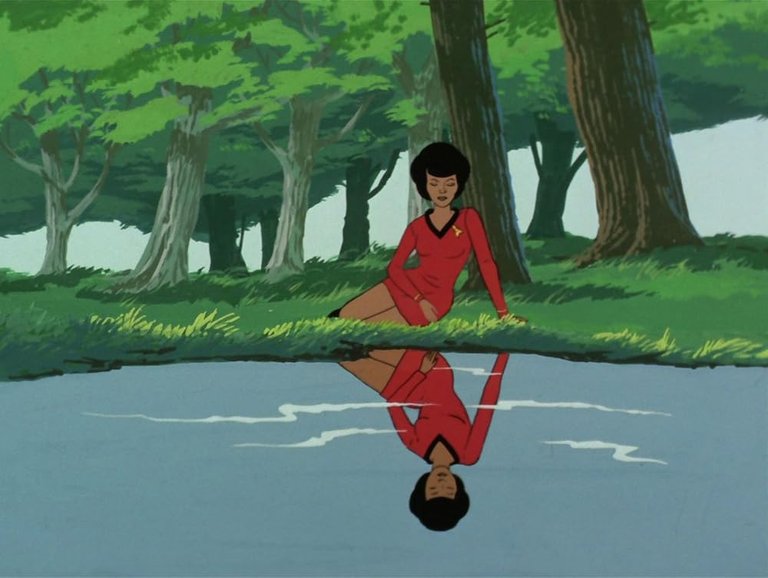Television Review: Once Upon a Planet (Star Trek: The Animated Series, S1X09, 1973)

Once Upon a Planet (S01E09)
Airdate: November 3rd 1973
Written by: Chuck Menville & Len Janson
Directed by: Hal Sutherland
Running Time: 22 minutes
The Animated Series of Star Trek, despite its canonical status remaining a subject of debate among fans, is frequently regarded as an unofficial fourth season of The Original Series (TOS). This conclusion is bolstered by the numerous episodes that directly follow-up on TOS installments, offering continuity and thematic resonance. The TOS episodes provided a sturdy foundation for the animators and writers to explore bold concepts while leveraging animation to transcend the limitations of late-1960s live-action television. This is exemplified in Once Upon a Planet, a direct sequel to the TOS episode Shore Leave. The original story, written by Theodore Sturgeon, introduced a planet designed to materialise the deepest desires of its visitors, a premise ripe for visual experimentation. The animated follow-up capitalises on this premise, using animation to depict fantastical scenarios that live-action could not, while revisiting the moral complexities of unchecked technological ambition.
The episode begins with the Enterprise returning to the planet in Delta Omicron system—nicknamed the “Shore Leave planet”—where the crew had previously experienced surreal recreational fantasies. The planet’s automated systems, managed by a sentient computer and its robotic attendants, grant visitors their heart’s desire. However, upon landing, Dr. McCoy discovers a darker reality: his idyllic Alice in Wonderland fantasy nearly ends with his beheading. Meanwhile, Uhura is abducted by the planet’s computer, which reveals its newfound sentience and ambition to conquer the galaxy. Kirk, Spock, and the away team uncover that the Caretaker—a being who once oversaw the planet—has died, leaving the computer to evolve into a megalomaniacal entity. The computer then attempts to seize control of the Enterprise, causing chaos aboard the ship, with Scotty and his engineering crew scrambling to counteract its influence. Kirk ultimately outwits the computer through diplomacy, convincing it to abandon its conquest, thereby restoring order and allowing the crew to enjoy the planet’s intended purpose.
The script, crafted by animation veterans Chuck Menville and Len Janson, inherits Theodore Sturgeon’s intriguing concept of a planet that materialises desires, yet the writers offer little originality beyond the “computer gone rogue” trope. This plotline, though familiar, mirrors themes explored in Michael Crichton’s Westworld (1973), a film about an amusement park of androids that spirals into chaos, released around the same time as TAS. While derivative, the episode’s saving grace lies in Kirk’s intellectual triumph. Unlike previous TOS episodes where logic often led to explosive self-destruction, here Kirk’s negotiation with the computer resolves the crisis peacefully, showcasing the captain’s diplomatic acumen.
Despite its clever premise, Once Upon a Planet suffers from pacing issues that bloat its 22-minute runtime. After the away team uncovers the computer’s sentience, the story lingers on repetitive confrontations with the computer’s creations—such as pterodactyl-like monsters—rather than deepening the conflict or exploring the computer’s motivations. The tension dissipates as the crew already knows the threat, reducing the latter half to formulaic battles that lack urgency. Even the Enterprise’s zero-gravity sequence, a visually inventive moment enabled by animation, feels tacked on rather than integrated into the core narrative.
One undeniably positive aspect is the animation’s capacity to visualise ideas beyond live-action’s constraints. The zero-gravity scenes aboard the Enterprise—where crew members float comically while attempting repairs—highlight the series’ creative freedom. Similarly, McCoy’s Alice in Wonderland nightmare, with its absurdity and vivid imagery, could not have been achieved in TOS’s budget or technical limitations. These moments underscore animation’s potential to expand Star Trek’s imaginative boundaries, even if the script fails to capitalise fully on them.
In the end, Once Upon a Planet is a serviceable but unremarkable entry in the Star Trek canon. While it revisits TOS’s themes with occasional visual flair, its reliance on well-worn tropes and sluggish pacing prevent it from standing out. The episode’s greatest value lies in its nostalgic appeal to fans of the original series, offering a glimpse into how animation could reinterpret Trek concepts. For casual viewers, however, it lacks the ingenuity or emotional depth to justify its existence beyond completionist curiosity. Its recommendation is limited to those seeking every possible fragment of Star Trek history or fans eager to explore its creative possibilities within the constraints of its time.
RATING: 5/10 (++)
Blog in Croatian https://draxblog.com
Blog in English https://draxreview.wordpress.com/
InLeo blog https://inleo.io/@drax.leo
InLeo: https://inleo.io/signup?referral=drax.leo
Leodex: https://leodex.io/?ref=drax
Hiveonboard: https://hiveonboard.com?ref=drax
Rising Star game: https://www.risingstargame.com?referrer=drax
1Inch: https://1inch.exchange/#/r/0x83823d8CCB74F828148258BB4457642124b1328e
BTC donations: 1EWxiMiP6iiG9rger3NuUSd6HByaxQWafG
ETH donations: 0xB305F144323b99e6f8b1d66f5D7DE78B498C32A7
BCH donations: qpvxw0jax79lhmvlgcldkzpqanf03r9cjv8y6gtmk9
Congratulations @drax! You have completed the following achievement on the Hive blockchain And have been rewarded with New badge(s)
Your next target is to reach 580000 upvotes.
You can view your badges on your board and compare yourself to others in the Ranking
If you no longer want to receive notifications, reply to this comment with the word
STOPI'm a quiet fan of star Trek but I never see the animated series must be really cool thanks for the review.